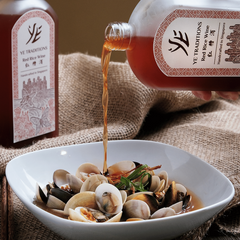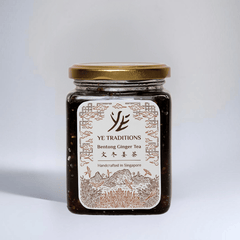Can I Cook with Rice Wine While Breastfeeding?
Many new mums ask: is it safe to eat dishes cooked with rice wine while breastfeeding? At Ye Traditions, we understand this concern. Chinese rice wine has been used for generations in confinement dishes, but modern parents want to balance tradition with safety.
Short answer: Yes—you can either wait till 2 hours after eating, or much sooner if rice wine is cooked properly. Alcohol drops significantly with simmering and boiling, and choosing long-simmered dishes keeps residual alcohol low. This guide explains how, with tips using Ye Traditions’ lighter ~7% ABV rice wine.
What Happens to Alcohol in Cooking?
Alcohol does not vanish instantly. How much remains depends on time, heat, pan size and method. Reference data used by dietitians shows approximate alcohol remaining after simmering or baking:
| Time at simmer/boil | Alcohol remaining* |
|---|---|
| 15 minutes | ~40% of the alcohol added |
| 30 minutes | ~35% |
| 60 minutes | ~25% |
| 120 minutes | ~10% |
| 150 minutes | ~5% |
*USDA Nutrient Retention Factors; multiple public-health references summarize these values.
Is Cooking with Rice Wine Breastfeeding-Friendly?
For most mothers, properly cooked dishes (soups, stews, braises) leave only trace amounts of alcohol and are generally considered compatible with breastfeeding. Risk is influenced by portion size, cooking time, whether alcohol was added early or late, and your individual comfort level.
- Best picks: long-simmered broths, soups, slow braises, and stews.
- Use modest amounts: A few tablespoons usually suffice for aroma and depth.
- Add early: pour rice wine in at the start so it simmers longer.
- Avoid: adding wine at the end of cooking or in raw marinades you don’t thoroughly cook afterward.
Why Ye Traditions’ ~7% ABV Rice Wine Works Well
Most commercial Chinese rice wines are 12–18% ABV. Ye Traditions is naturally brewed to a gentler ~7% ABV — adding less alcohol per tablespoon while still delivering aroma, warmth and depth. It’s ideal for classic confinement dishes where you simmer the broth or sauce 30+ minutes.
- Handcrafted with glutinous rice, yeast, and water
- No preservatives, added sugar, or salt
- Heritage recipe passed down for five generations
Simple Safety Tips
- Choose simmered preparations (30–60 minutes).
- Keep portions moderate; cook sauces uncovered to help evaporation.
- If you’re concerned, time feeds so there’s a 2–3 hour buffer after any dish where wine wasn’t cooked long.
- When in doubt, speak with your healthcare provider or a lactation consultant.
This article is informational and not medical advice. For personal guidance, consult your clinician or lactation specialist.
FAQs
Does cooking remove alcohol completely?
No. Even after 2.5 hours of simmering, about 5% of the added alcohol can remain. Longer simmering and wider pans lower residual alcohol more.
If I eat food cooked with wine, do I need to wait before nursing?
For long-simmered dishes, residual alcohol is typically very low. If you feel unsure, allow a buffer of 2–3 hours. If you consumed an alcoholic drink, follow the “at least 2 hours per standard drink” guidance.
Do I have to pump and dump?
No. Pumping does not clear alcohol from milk faster; alcohol leaves milk as it leaves your bloodstream. Pump only for comfort if you miss a feed.
Is Ye Traditions’ ~7% ABV rice wine safer than 14% for cooking?
Lower ABV means less alcohol is introduced per tablespoon. Combined with simmering, it helps keep residual levels minimal while delivering flavor.
References
- USDA Table of Nutrient Retention Factors (alcohol retention across cooking times).
- Centers for Disease Control and Prevention (CDC): Alcohol & Breastfeeding guidance (2+ hours per drink).
- NIH LactMed® database: Alcohol – effects on lactation and recommended timing.
- NHS Start for Life: Alcohol and breastfeeding advice.







Leave a comment